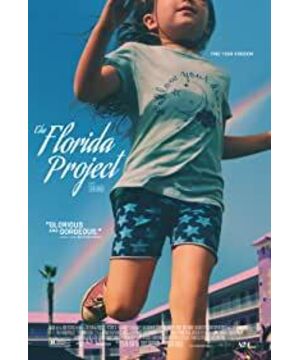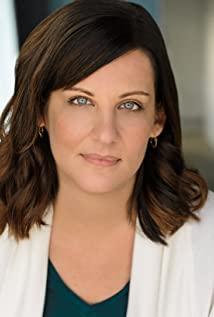In this world, no matter what social form, its structure is always pyramid-shaped. There are people at the top, and there are people at the bottom. Director Sean Baker has always aimed his shots at the fringes of mainstream American society, and his latest film, "Florida Paradise," is no exception.
The film mainly shows the daily life of a mother and daughter. They live in a motel next to Disney World in Orlando, USA. Her mother, Harley, has no proper occupation. She occasionally sells inferior pirated perfumes to tourists to earn some extra money. She accepts assistance from her best friend from time to time, and even engages in prostitution in the room where their mother and daughter live; her daughter, Moni, is in the car with her two friends. Playing around the hotel, constantly making troubles, and occasionally encountering old men with pedophiles. These things are trivial and illogical, and it is this routine that makes up the film.
Sean Baker apparently wants to use this film to depict the "distressed" life of the underprivileged and to ridicule the people in the bustling center of the city. First of all, the original title of the film is Florida Project , and Orlando Disney World was called the "Florida Project" at the beginning of planning; The environment here was completely different from what they imagined, so they got into trouble with Bob, the hotel manager. The wife offers to check in at another hotel (and names several well-known Florida resorts) and walks away angrily saying she will never stay in a motel; in the end, the kids dominate the movie. The film spends a lot of ink on their playful scenes. In their view, the motel surrounding is their paradise, and they play and explore unscrupulously. It seemed like a utopia in their eyes. And all the embarrassment in the adult world has nothing to do with them. Thus trying to use children's "pure" vision to "reflect" the unbearable adult world.
However, the childishness and eccentricity of the mother Harley dispel the pungent irony of the film. That is to say, the life plight of Harley's mother and daughter is largely caused by Harley herself, and has nothing to do with society. Their lives seem to be a re-enactment of JD Vance's "The Countryman's Elegy."
Vance was born into a low-class white family in the United States and experienced a rather tragic childhood. His mother had been taking drugs, drinking, changing partners, beating him from time to time, and never changing. Thanks to his grandmother Brandon who has always encouraged and supported him, he was able to persevere and finally graduate from Yale Law School with a good life.
"The Elegy of the Countryman" is a biography written by Vance for himself. Through this book, he tried to prove that a person's living environment has a lot to do with whether he can achieve success in the worldly sense. Among them, he talked about his summer work experience in the introduction part of the book. He got a job as a bricklayer the summer before entering law school. Although the work is hard, the salary is not low, and the income is 13 US dollars an hour. And this income still has room to rise. Old employees who have worked in this company for a few years can earn at least $16 an hour, which translates to an annual salary of $ 32,000 , which is much higher than the poverty line. It is difficult to find long-term workers for such a job with a stable income. At the same time, one of his co-workers has a bad attitude towards work, often skipping work, and often uses the toilet to avoid work when he goes to work. In the end, of course, he could not escape the fate of being fired. Much like Vance's co-workers, Halle didn't like a good job, but what's more, she never tried to find a serious job. On the other hand, her best friend Ashley worked as a waiter in a restaurant. Although her life was not very good, at least she never worried about the rent, and she could help her poor best friend Harley from time to time.
Therefore, Harley, a mother who is extremely irresponsible to herself and neglects to discipline her children, is not worthy of sympathy. But paradoxically, the film seems to deliberately maintain the image of Harley. There are a lot of scenes of him having fun with Mo Ni in the movie, and Mo Ni has a lot of fun with her, and at the same time, she never gets mad at Mo Ni. When prostituting, let Mo Ni dodge, and forbid the client to have contact with Mo Ni. At the same time, the film casts the Administration for Children and Families (DCF) as a close-to-villain character. As an intervenor, DCF " destroyed " Mo Ni's original happy life, and Mo Ni could only escape to Disney World hand in hand with her friends. In this way, the film successfully shifted the contradiction and washed Harley white.
But no matter how the movie whitewashes Harley, the background of her life will not change. The fact that she's a "mother bear" doesn't change. What is saddening is that the "bear mother" must have educated a "bear child". Just as Vance wrote in the tone of "country people" in "The Elegy of the Countryman", "We are the culprits, only we are the culprits. You can solve it yourself.”
View more about The Florida Project reviews










